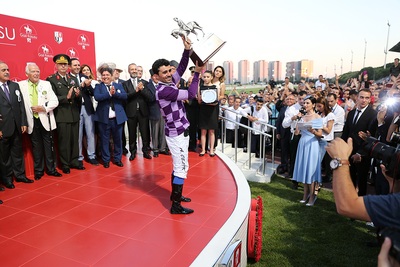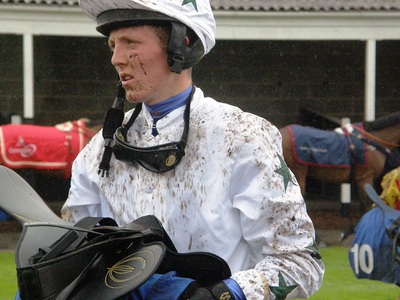The vast majority of horse racing punters tend to only watch when there is a huge event. Festivals like Cheltenham , Royal Ascot or the Grand National are naturally more attractive and memorable to people than a Tuesday afternoon meeting at Fakenham.
Because of this, casual watchers are used to seeing helicopters or small private jets in the background during TV coverage and assume those riding in the Sport of Kings are all incredibly rich. Now, some riders have done well out of the game but for most jockeys the financial situation is dire.
Rich Jockey Poor Jockey
 At the top end of the sport for sure it is lucrative; Frankie Dettori for example is a global celebrity for a reason. He rides top class horses in the biggest races all around the world in front of huge TV audiences and with that comes a more than acceptable remuneration.
At the top end of the sport for sure it is lucrative; Frankie Dettori for example is a global celebrity for a reason. He rides top class horses in the biggest races all around the world in front of huge TV audiences and with that comes a more than acceptable remuneration.
There’s not much of an in between either. As well as a percentage of what is huge prize money for winning the best races around, Dettori, Ryan Moore, William Buick and the likes usually have retainers with a top trainer and/or a top owner. This means they have a salary as well as claiming their percentages so a living is guaranteed for them to one level or another.
But for the vast majority of race riders the situation is very different. They are self employed meaning they effectively have to charge for each ride they take. What they earn will barely cover food, drinks and especially travel costs and so they are reliant on winners for money and believe me, winners are hard to come by.
A Breakdown of a Jockey’s Earnings
 Riding fees in the UK are set at £120.66 on the flat and £164.74 in the National Hunt sphere. If a rider is fit, in form, has a good agent and is riding on the flat at the height of the summer when he can attend meetings in the afternoon and the evening (and that’s a lot of ‘ifs’), then they may ride 10 horses which will equal £1206.60 in riding fees.
Riding fees in the UK are set at £120.66 on the flat and £164.74 in the National Hunt sphere. If a rider is fit, in form, has a good agent and is riding on the flat at the height of the summer when he can attend meetings in the afternoon and the evening (and that’s a lot of ‘ifs’), then they may ride 10 horses which will equal £1206.60 in riding fees.
That sounds OK to most people, but freelancers and other self employed people reading this will know immediately that is only half of the story. From the original riding fee, 10% goes to the jockey’s agent and 3% to the union (PJA – Professional Jockeys Association).
The valet handling the equipment gets 10% of the first riding fee of each day, 7.5% for the second and 5% for the third. Then there is insurance, medical, a fee for what is essentially ‘racing banking’ (Weatherbys) which handles the fees in the first place. Weatherbys even charge 50p for every line shown on a jockey’s statement!
On a typical summer day then with a popular jockey getting plenty of rides, they may rake in an initial £1206.60 but even those basic deductions will bring this down to about £800-£900. That still seems like a good living to most people but remember, this is at the height of the season, IF the jockey is fit and popular with trainers and they will not do this every day. A few times a week at best in fact if they’re lucky.
Even when a flat jockey is working this hard and earning as much as possible, it’s very much a seasonal thing. Due to all weather tracks, flat racing in Britain can continue all year round now but the real earning potential for flat jockeys comes really between May and October, much like hotel workers in many a holiday resort in the Med.
Using averages then; a typical flat jockey will ride 300 times a year. In riding fees, that puts their self employed normal income at £36,198. Normal deductions will take this down to around £27,000 which puts the jockey right at the average UK income before tax, but no more.
Luckily, these are sports people and they have a natural urge to want to win. So, the bonuses involved naturally revolve around taking a percentage of prize money won. On the flat, this equals 3.5% of placed prize money and 6.9% of winning prize money. The percentage is bigger over the jumps (8.5%) but then the overall prize money is larger on the flat. Whatever the slice of prize money, the agent of course takes 10% of that too.
Keeping up?
Winning Prize Money
 People in Britain love an underdog and so you can understand why, if you know the ins and outs of jockey’s earnings, they love to see competitive handicaps. As well as them being a big spectacle and punters taking pride in picking the winner of a 30-runner race, the chances are the winning jockey may also not be one of the big names and so getting their 6.9% slice of perhaps a £100,000 pot is a big pat on the back.
People in Britain love an underdog and so you can understand why, if you know the ins and outs of jockey’s earnings, they love to see competitive handicaps. As well as them being a big spectacle and punters taking pride in picking the winner of a 30-runner race, the chances are the winning jockey may also not be one of the big names and so getting their 6.9% slice of perhaps a £100,000 pot is a big pat on the back.
There is no way a jockey can rely on this though. Having an association with even one particular horse may mean a great season. A jockey may win a number of high profile and valuable races meaning they could rake in some good prize money, however the next year they may make only a fraction of that.
There are of course opportunities for sponsorship, though given the rules of racing they are not free to advertise what they want, where they want so such opportunities are fairly limited to say the least.
The typical jockey will spend more than £5,000 every year in fuel costs just to cover heading to the races, another huge chunk of money to come off their top line before they even think about net. That alone takes them down to £22,000 per year before bonuses and tax. Not a huge salary I think you’ll agree.
What a lot of people don’t appreciate either is that jockeys actually turn up at stables at the crack of dawn most mornings to ‘ride work’. Riding work basically means riding horses in their training, something which helps them to get rides from grateful trainers. This is something they don’t get paid for, but they may still face travel costs.
After everything has been added, deducted and all the rest of it, the jockey has to pay tax. Given how busy they need to be just to make this money in the first place, they of course rarely have the time to be able to do this and that means an accountant. More cost!
At the top end of the sport, it’s estimated that some jockeys can bring in £200,000 in a year before tax given their profile and the types of races they are involved in. A top jump jockey can earn £135,000 but a typically fairly popular, hard working British based flat jockey will bring in perhaps under £20,000 before expenses or tax.
Those helicopters and aeroplanes are for the few, not the many.